We’re going to be talking about the truth about your health. What is healthy? Healthy means a lot of different things to different people. I wanted to go ahead and lay it out there in terms of the dictionary definition so that we’re on the same page.
And basically, if you look at the dictionary definition, healthy is enjoying good health being free from disease. That’s what healthy means. When I’m talking about eating healthy, cooking, healthy, being healthy, is with regard to being free of disease. That’s all that it means in that context. Everybody has a different meaning or interpretation that they associate with health.
Some people might think that it’s having freedom, energy, quality of life, things like that. I’m curious what you guys would consider healthy.
I want to also share seven myths and misconceptions surrounding healthy. I put seven of them together for different varieties of food, as you can see here.
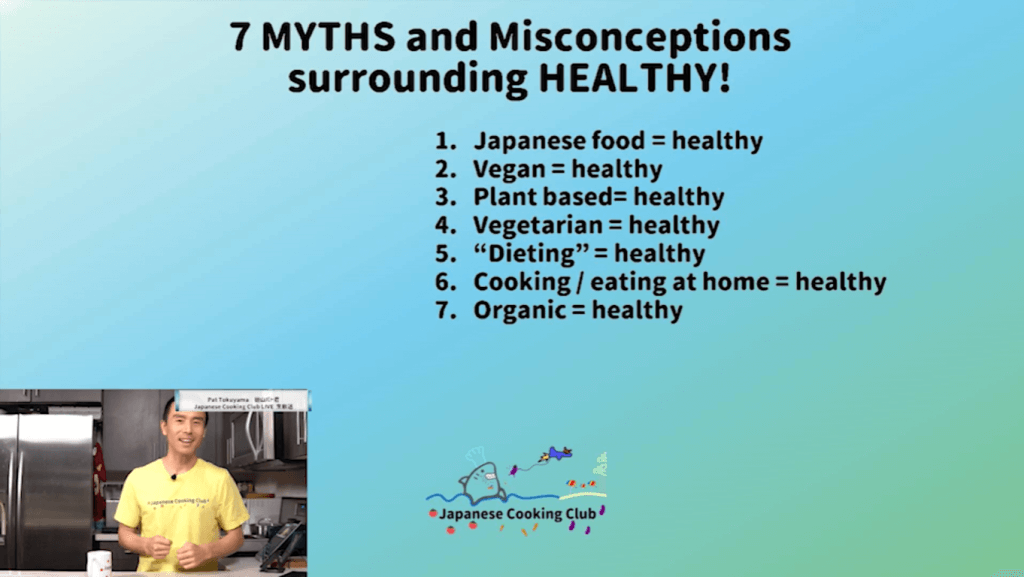
We have Japanese food equals healthy, which we already sort of debunked before. Not all Japanese food is healthy.
But my philosophy on health, cooking, and eating is that everything in moderation is just fine. Vegan is not necessarily healthy because it depends on what you’re eating in terms of vegan food. A lot of vegan food can be very, very processed, especially if you’re eating at a vegan restaurant where they’re putting a bunch of stuff together where the food is not fresh. It doesn’t necessarily mean that it’s healthy just because it’s vegan. Same thing with plant-based. Just because it’s plant-based doesn’t mean that it’s healthy.
You got to do whole food plant-based, which is what I’ve been talking about the past few days, same with vegetarian and dieting. I mean, it depends on the situation. It depends on the diet. This is sort of like a broad generalization there, but in general, just because something’s vegetarian or just because something is part of a diet doesn’t necessarily mean that it’s healthy
Also, cooking and eating at home does not necessarily make your food automatically healthy. Especially if you’re not going to be using whole foods. If you’re going to be using a bunch of stuff that’s been processed, like boxed mixes, like Pasta Roni, canned foods, boxed foods, a lot of sauces or condiments that have a lot of preservatives and stuff like that.
It’s not necessarily the healthiest thing to eat. Same with organic foods. Just because something has a label that it’s organic doesn’t mean that it’s a whole food and is very healthy for you. There’s a lot of processed organic foods, things that are shelf-stable. All the aisles in the middle of the grocery store might have some organic foods, but they’re shelf-stable. They have preservatives and things like that that may not necessarily be the best thing for you.
Those are a few myths regarding healthy and what healthy is.
The Best Way to Stay Healthy
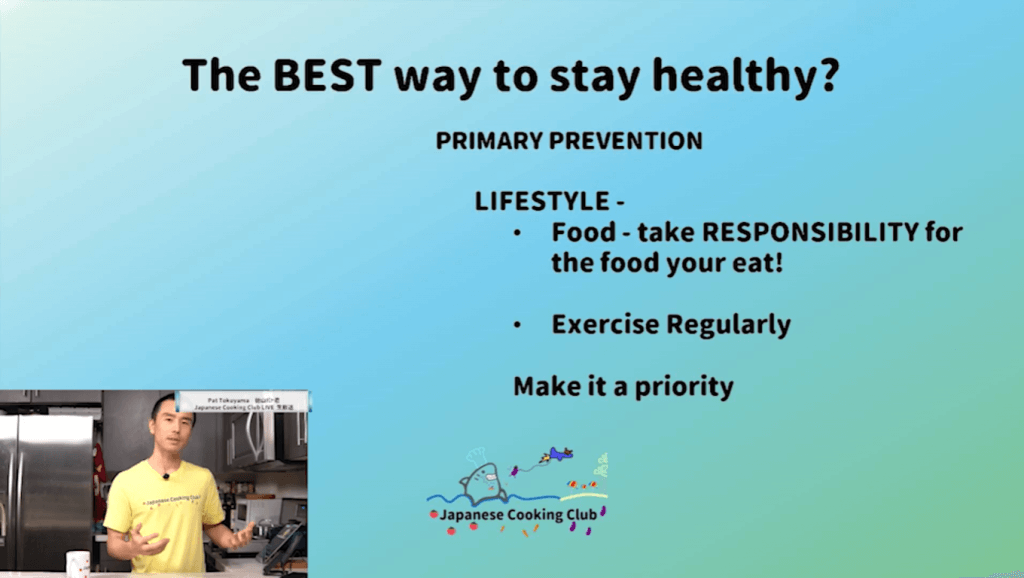
The best way to stay healthy? Well, what could that be?
Basically, it comes down to primary prevention. Like we talked about on the first day, primary prevention is preventing chronic disease from happening in the first place.
And the way that you do that is by eating, and then diet and exercise. You gotta stay active. Those are the two things that are advocated or that are recommended in all the national treatment guidelines for diabetes, hypertension, cholesterol, etcetera. Eating habits and exercise are key.
Making sure that you can take responsibility for the food that you eat, also exercising regularly, not just one-off, or when you feel like it. Making it part of your routine. Make it a priority, no excuses. Just make it part of your lifestyle and your habits that you do it as opposed to not doing it.
Nine situations when eating may not be healthy
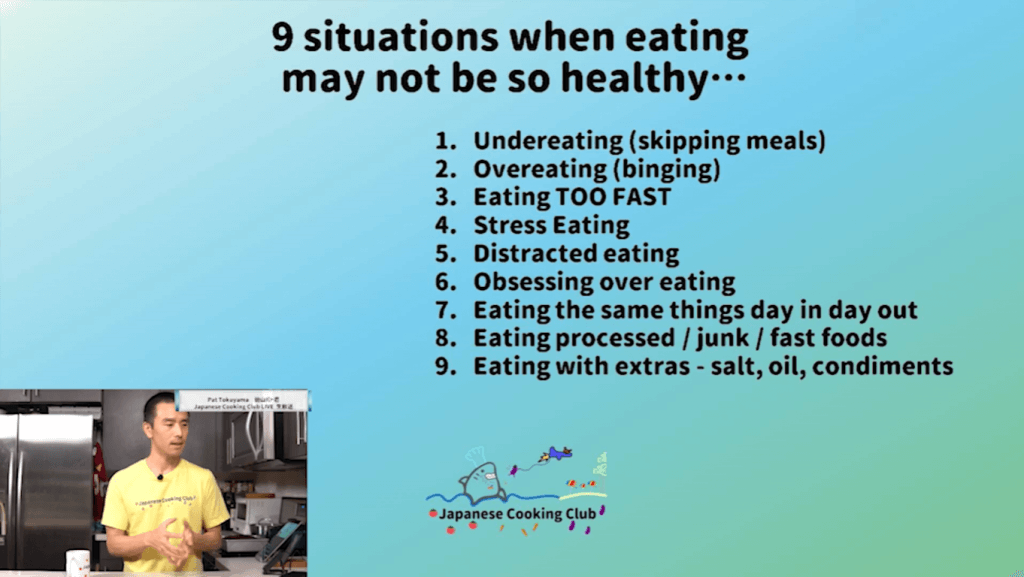
This sort of goes into a little bit of a different topic. And I’m still wanting to cover it because I thought it was relevant and worth discussing with you guys.
Undereating. Skipping meals is not good. Maybe you’re always on the go, maybe you travel lots or something like that. But if you skip meals or maybe you have a very light meal, later on, you’re going to feel hungry because you didn’t eat enough. And then, you’re going to overeat or you’re gonna need something that’s not necessarily healthy because you’re going to be snacking.
You’re gonna be eating like some sort of snack food, like maybe chips, granola, or some other snack, like a fruit bar or something like that. And that’s not necessarily the best thing for you as compared to eating a complete meal.
Overeating. This is also an issue for some people where you might overeat because you feel that you have to finish all of the food that’s on your plate.
I don’t know if you guys have traveled outside of the US but in traditional American restaurants, you may notice that the portions are very, very big, especially if you go to like a steakhouse or like any kind of an American restaurant. Usually, you can probably split the portion in half and share it with another person.
And if you take your time eating the food, it would probably fill you up. Traveling to Asia and other countries, I’ve noticed that one of the main differences in terms of eating out at restaurants is that the portion sizes here in America are a lot bigger and bigger is not always better, especially if you’re going to be overeating. Also binging on food is not necessarily a good thing.
I know that for some people when they go on diets, they’ll get cravings for food that they cannot eat because they’re restricted from eating it. And so, they might break their diets for a day and go on a binge. That’s not necessarily the best thing for you.
Eating too fast. If you eat too fast, your body is not going to be able to catch up with you and tell you that it’s full and to stop eating, especially if you’re stuffing her mouth, like with a huge burrito, it’s like, you’re on the go. Maybe you’re driving and you’re eating at the same time and you’re just stuffing your face with all this food. Your body’s not going to be able to tell you that it’s full.
Stress eating is another thing that people have trouble with and can be a barrier to eating healthier. I can tell you, for one thing, I, myself, when I get kind of stressed, I like to eat. I think it just calms me down. It makes me feel better. I recognize that it’s not necessarily good behavior to have, and I admit it.
And it’s something that I’m working on. And that’s maybe something that you have issues with as well.
Distracted eating. This is another thing that I think may not necessarily be healthy and this has to do with overeating. if you’re distracted and you’re not necessarily paying attention to what’s in front of you on your plate, maybe you’re watching TV. Maybe you are, I don’t know, watching sports on the TV or something like that, watching a movie like eating popcorn in a movie. And you’re just stuffing your mouth with popcorn and not really paying attention to the taste, or the flavor, or the aroma. And you might overeat in that situation because you’re not really focused on what’s in front of you and what your body’s telling you.
Maybe you’re just engrossed in the movie. You might eat a lot more than you should have in the first place than in the situation that you were just looking at your food and nothing else. That’s another potential situation that might not be healthy. And let me know if you can relate to any of these chances are, maybe you’ve had one of those situations happen to you where you’re distracted, or maybe you ate too fast and there’s nothing wrong with it. I’m not here to tell you that you’re a bad person or that you shouldn’t do it. I’m just trying to get you to recognize it and see it that you can make note of it and potentially change that habit or that behavior. you can be healthier.
Obsessing over eating. I know that’s one thing that certain people are more prone to is kind of being OCD is like, Oh my God, I cannot eat this. Oh my God, I gotta eat this. And just obsessing over stuff like that. It’s not necessarily a good thing at least from a mental health standpoint. And I know that some people are affected by that.
Eating the same things day in and day out. That’s not necessarily healthy because you want to eat a varied diet, a balanced diet. That means different types of food. And I know not everybody’s into food, but chances are, if you’re watching this video, you enjoy food. And you’re a foodie, somebody who likes to cook and likes to enjoy food. You probably don’t necessarily eat the same things day in and day out. But if you do, maybe, that could be a barrier for you to eat healthier because you’re not eating a very good diet.
Eating processed foods, junk foods, fast foods. I think we all know that those are not necessarily the best things for us to be eating. But they’re convenient. And that’s why we all eat them. If you didn’t get a chance to cook for leftovers, or you ran out of leftovers or you’re traveling, it’s very convenient for you to just get some fast food, as opposed to maybe going to some grocery store or a salad bar or whatever to get a healthier type of meal.
The last thing is eating with extras. Things like salt, oil, extra condiments or seasonings, that can certainly help to increase the amount of salt or sugar that you’re ingesting and may not necessarily be the best thing for you.



Konnichiwa! (Hello!) I'm Pat Tokuyama, a Japanese tofu cookbook author, who travels for music, food, and adventure. If you like Japanese tea, checkout some of the newestorganic japanese tea, matcha bowls and noren and more!
** Curious about the Plant Based Japanese Cooking Club? ** Learn more here!
Can you measure healthy?
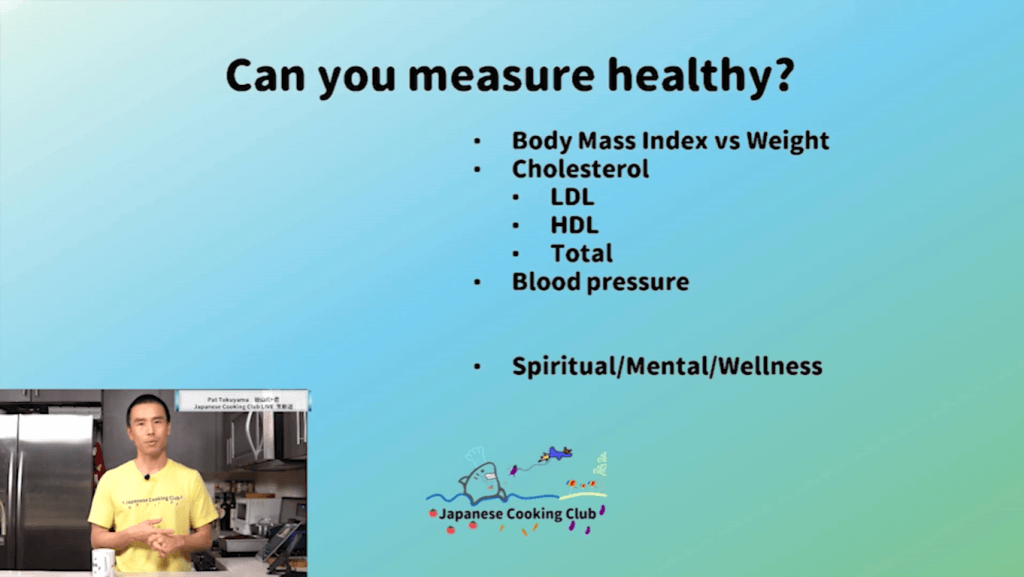
Yes. Even though a lot of those different things that we were just talking about are not necessarily measurable, some of the things that we can measure to get an idea of our health are measurable.
A couple of examples here, one is going to be body mass index, which is going to be a measurement of your weight as compared to your height and your body. It’s not just your weight, which isn’t necessarily as accurate because everybody has different shapes and comes in different sizes with regards to your body.
And just looking at the weight, it’s not a very good indicator.
Body mass index is a little bit more accurate in that regard. Same with the cholesterol. if you guys don’t get your cholesterol checked at your physical, your annual physical, which you guys should be doing to make sure that you’re healthy. Cholesterol is one thing that you can measure.
You have your good cholesterol, your bad cholesterol, your total cholesterol. And then for some people, the triglycerides or the fat is another thing that they’ll look at. Also, blood pressure.
That’s another indicator of how healthy you are. And then, also spiritual and mental wellness, are other things that you can measure your health with. In terms of, yeah, spirituality, like your faith. And if you feel stressed all the time, that might not necessarily be the best thing for you versus if you feel like you don’t have any inspiration, things like that.
Your health is in your hands.
How to stay healthy? Like we’ve talked about, primary prevention is the biggest thing. exercise is one way that you can do that with primary prevention. Food is another way. Mindfulness, which I’ve touched on previously. The spirituality, your faith, your community, and your relationships, all of those things will help to keep you healthy.
I know what you might be thinking. You might be thinking that there’s not enough time for you to learn how to cook or learn how to cook with plant-based foods.
With billions of people in the world, chances are, there are some people that have less time than you do, but still, somehow, someway, take the time to take care of themselves and also cook healthy food, and make it a priority in their lives. And if they can do it, so can you.
The same thing applies to money.
With billions of people in the world, chances are, there are some people who have less money than you do, but still somehow, someway, they find the money to take care of themselves to be healthier. And they make plant-based cooking or foods a priority in their life. If they can do it. can you.
With billions of people in the world, chances are there’s somebody who has fewer skills and experience than you have, who is able to make plant-based foods, healthy foods, this healthy lifestyle that I’ve been talking about over this three-day series. Part of their lifestyle and their habits, their routine, and if they can do that, make that a priority, then so can you.
And I guess the last thing that I was going to wrap up in this section is that when there’s a will, there’s a way. With billions of people in the world, chances are, there’s somebody who wants to make this happen.
And because they want to make it happen, you can make it happen too.


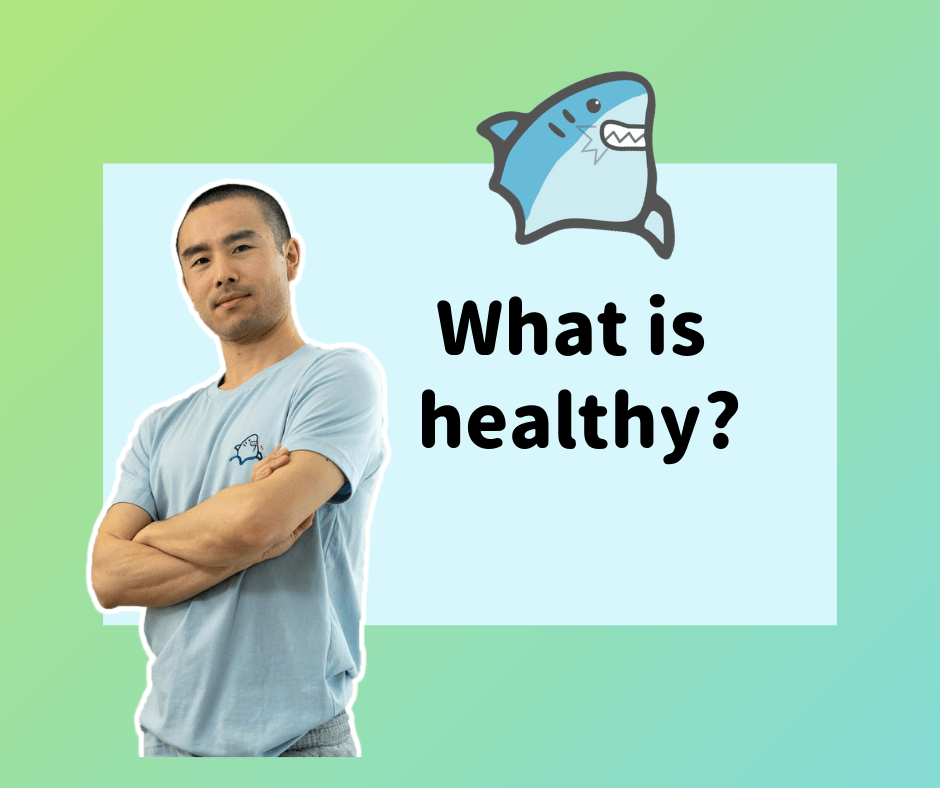
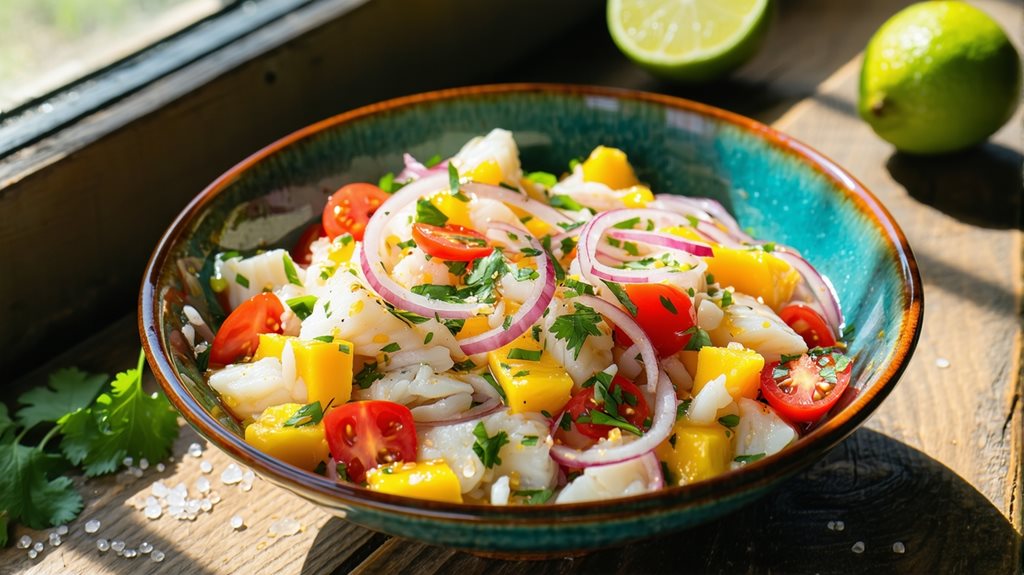
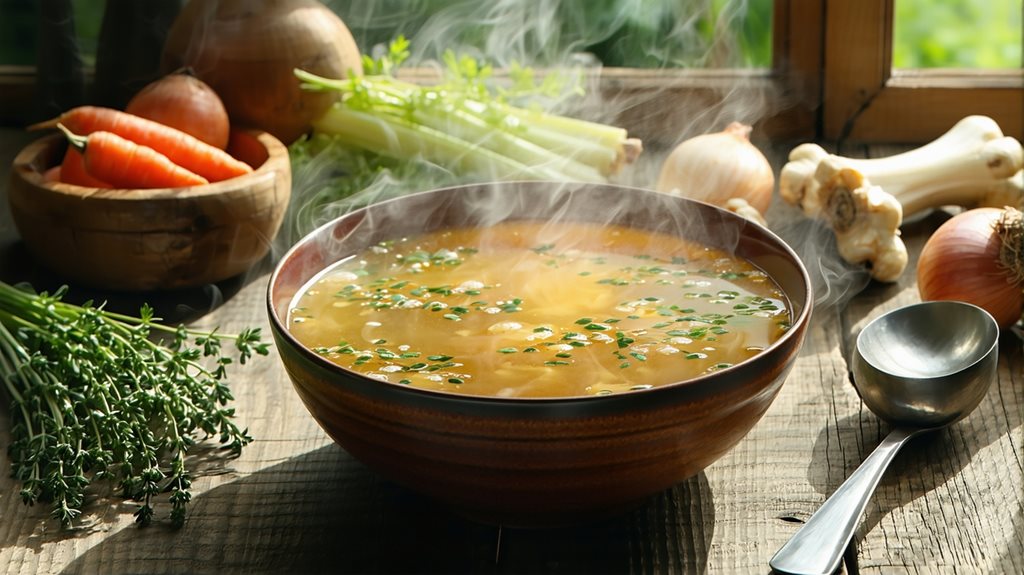
Konnichiwa! (Hello!) I'm Pat Tokuyama, a Japanese tofu cookbook author, who travels for music, food, and adventure. If you like Japanese tea, checkout some of the newestorganic japanese tea, matcha bowls and noren and more!
** Curious about the Plant Based Japanese Cooking Club? ** Learn more here!